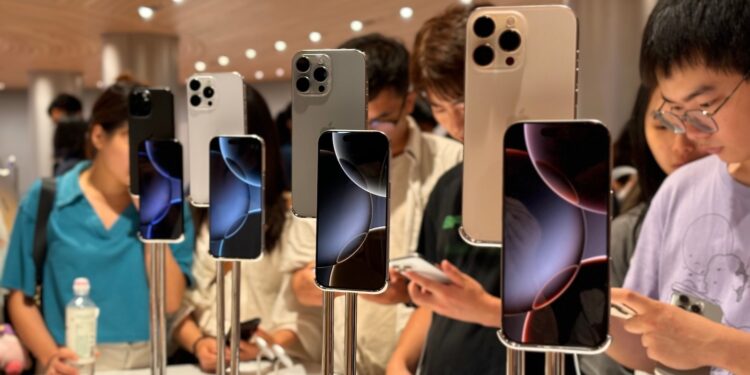If you own an iPhone or are considering getting one, it's worth taking a look at China. Demand for Apple smartphones is declining significantly there. New figures show how hard Apple is being hit by the growing success of Chinese manufacturers.
Apple was long a status symbol in China. But in March 2025, the picture changed. iPhone shipments plummeted by almost 50 percent compared to the previous year. Instead of 3.75 million units, only 1.89 million were sold. Apple's market share is thus around 8 percent. At the same time, Chinese brands such as Huawei, Vivo, Xiaomi, and Oppo are taking control of the market.
iPhone sales fall dramatically
According to the China Academy of Information and Communications Technology (CAICT), shipments of foreign brands fell by 49.6 percent year-on-year in March 2025. This primarily affects the iPhone. In the same period in 2024, 3.75 million devices were shipped, compared to just 1.89 million in March 2025. This corresponds to a share of only 8 percent of the total smartphone market. Chinese manufacturers now dominate with 92 percent. In the first quarter of 2025 as a whole, shipments of foreign smartphones in China fell by more than 25 percent.
- Interestingly, overall smartphone sales in China increased by 3.3 percent. This means that the market is growing, but Apple can no longer keep up.
Local brands take the lead
According to an analysis by Counterpoint Research, Huawei leads the market with a 19.4 percent share. Vivo follows with 17 percent, Xiaomi with 16.6 percent, and Oppo with 14.6 percent. Apple ranks fifth with 14.1 percent. Huawei has re-established itself as a strong alternative to the iPhone through its own chip development and its proprietary operating system, HarmonyOS Next. The devices are technically advanced and sometimes more affordable than Apple's products.
Benefits from government subsidies
Another factor that strengthens Chinese manufacturers: electronics products under 6,000 yuan (approximately $820) are subsidized by the government by 15 percent. While the iPhone 16, with a starting price of 5,999 yuan, is below this threshold, many models are more expensive. Consumers therefore prefer local brands, which are made even more attractive by the subsidies.
Problems at Apple: Price, AI, pressure to innovate
Apple faces several challenges. One is pricing, the other is technological development. Especially when it comes to integrating generative AI features, Apple is slower than Chinese manufacturers. In an innovation-driven market like China's, this is a clear disadvantage. Chinese brands regularly bring new features and technologies to market, while Apple lags behind.
Apple's countermeasures
In response to the slump, Apple has reduced the prices of certain iPhone 16 Pro models ahead of the Chinese shopping festival "618." CEO Tim Cook also commented on the situation. He acknowledged that sales in Greater China fell by 2 percent in the quarter ending March 2025. Nevertheless, this is an improvement compared to the 2024 holiday season, when sales fell by 11 percent.
iPhone: The Chinese smartphone market is turning against Apple
Apple is under intense pressure in China. The nearly 50 percent decline in iPhone shipments in March 2025 clearly demonstrates the extent to which local manufacturers now dominate the market. Supported by government subsidies, proprietary technological developments, and better value for money, Chinese brands are steadily gaining market share. Apple is responding with price adjustments and citing a slight stabilization in sales, but its structural competitive disadvantage remains. The coming months will show whether Apple can hold its own in this environment. (Image: Shutterstock / Wist2010)
- Apple and Trump: How phone calls can save billions
- Apple expands India: iPhone exports to the US doubled





